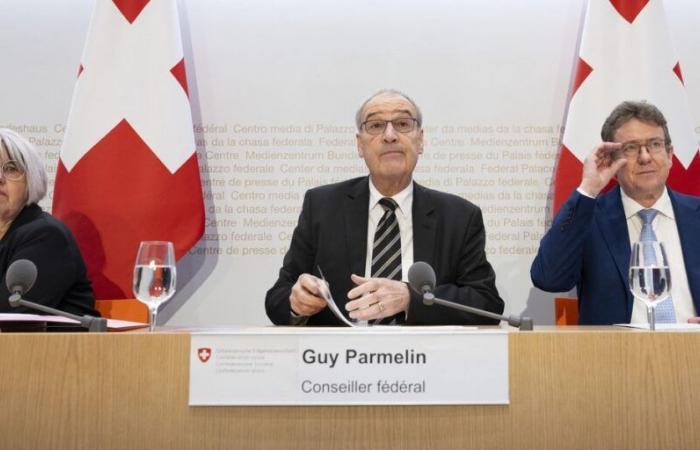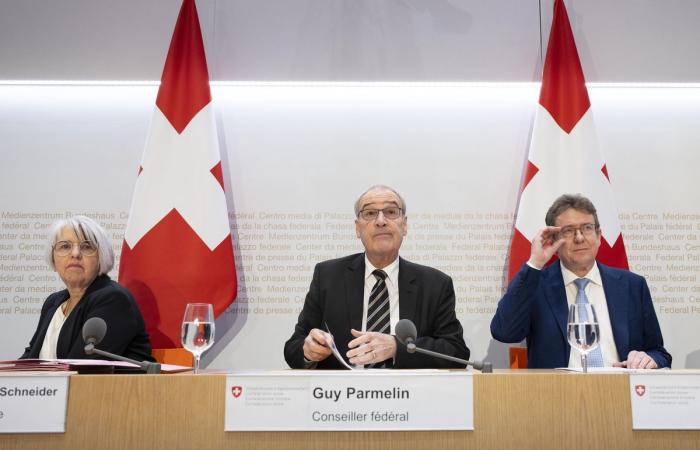Three no’s and only one yes –
Women have (almost) always been right in the ballot
How can we explain the victory of EFAS, the double no to lease law and the rejection of motorways? Responses with the post-voting survey.
Published today at 6:31 a.m.
Elisabeth Baume-Schneider, Guy Parmelin and Albert Rösti.
keystone-sda.ch
Subscribe now and enjoy the audio playback feature.
BotTalk
If the rejection of motorways is above all linked to a gender divide (the former said yes at 56%, the latter said no at 61%), Albert Rösti also owes his failure to the lack of support from the bourgeois camp.
According to the post-voting survey by Tamedia (publisher of this content), 31% of UDC voters voted against the project. It’s even 46% in the Center and 25% in the PLR. Opposite, the opponents closed ranks: 81% against the PS and 90% among the Greens.
Another surprise, the absence of a city-country divide. If 57% of urban voters voted no, rural voters were not left out: 53%. Only the urban vote was close: 50%-50%.
Two arguments tipped the balance. The fact that “the development of motorways encourages new traffic” was cited by 39% of people who rejected the text. 38% of them also believe that “in the face of the climate crisis, the extension of motorways is not appropriate.”
Finally, note that this no is not a «no go» for the roads. When respondents were asked if they remained in favor of new motorway extensions, 48% answered yes, compared to 51% who said no.
Rules against Airbnb
Women also made the difference on the two revisions of tenancy law. Concerning the new rules related to subletting, the female electorate said no at 56%, while men would have accepted it at 54%. For termination for personal reasons, it’s more or less the same thing: 59% of women said no; men, yes at 52%.
For the rest, these two elections resulted in the traditional left-right, but also urban-rural divisions. It is in fact a yes that emerges in the countryside for both texts, while the towns and cities clearly say no.
We will also remember that a large majority of Swiss people (65%) believe that new rules are needed to limit rentals via Airbnb or other similar platforms. They are calling in particular for legal regulations which would limit such rentals to 90 days per year.
Should we have fewer hospitals?
Of the four objects, however, there remains one on which the women lost. While 53% of them voted against the reform which aims to standardize healthcare financing, it was ultimately the men and their 60% in favor who tipped the scales.
The opponents – PS and unions – also had difficulty convincing their own camp, since 31% of socialists voted in favor of the text. The Greens were divided: 40% yes and 60% no, as well as the UDC which only gave lip service to the vote (51%). The Center (62%), the Green Liberals (70%) and the PLR (76%) were the most favorable to the project.
After this reform, should Switzerland embark on reducing the number of hospitals to concentrate on the largest structures? The population seems divided. 47% of those questioned answered yes, compared to 48% who leaned towards no.
“Latest news”
Want to stay on top of the news? “24 Heures” offers you two appointments per day, directly in your email box. So you don’t miss anything that’s happening in your Canton, in Switzerland or around the world.
Other newsletters
Log in
Florent Quiquerez has been a journalist in the Switzerland section since 2015. Specializing in politics, he primarily covers federal news. Previously, he worked as a parliamentary correspondent for Radios Régionales Romandes.More info
Did you find an error? Please report it to us.
71 comments







